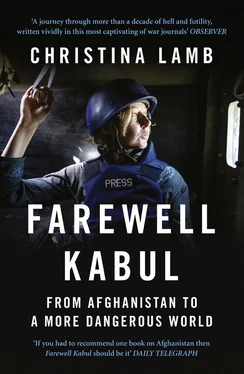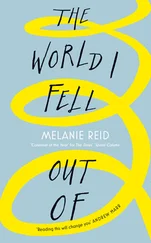Back in London, Justin and I got help from an unexpected source when Iran obliged us with visas to get into Afghanistan from the west. We flew to Tehran, then to the pilgrim town of Mashad near the border, and drove into Herat the day after the Taliban left. We were helped by Ismael Khan, a warlord who looked the part, with his flowing beard and trucks of neatly clad but fearsome gunmen who accompanied him everywhere. I’d first met Ismael when I went to Herat during Russian times, and his resistance was legendary. He had been imprisoned during the Taliban after being betrayed by General Dostum’s men, though he’d managed to escape. Although part of the Northern Alliance he had his own status as ‘the Emir of the West’, and as soon as the Taliban left he took power in his home city.
From Herat we managed to catch the first Ariana flight to Kabul, a nerve-racking experience, as I’d never before been on a plane that had to be jump-started. As we flew awfully close to mountains, the pilot told us the only instrument working was his ‘vision’.
But we made it, and found ourselves in the Mustafa. It had been a complicated journey that in a way felt the culmination of years, not just months. We had hardly any electricity and little food, but we were happy. Wais even got hold of a TV so we could watch BBC World on the occasions when there was electricity.
The challenges ahead were brutally clear. There was destruction everywhere – parts of the city such as Jadi Maiwand, the old carpet bazaar, and the road to Dar ul Aman palace, resembled pictures of Dresden after the bombing of the Second World War. The once sparkling-blue Kabul River was a brown trickle clogged with evil-smelling garbage. I went to visit the Children’s Hospital, where the doctors told me the power often went off in the middle of surgery, so children just died. My own son had been born more than eleven weeks premature two years earlier, and I asked a doctor what would happen to him if he were born in the hospital. The doctor looked at me as if I was mad. ‘He would die of course,’ he said. Afghanistan was the worst place in the world to be a mother or a child.
After I wrote of this in the Sunday Telegraph , generous readers raised money for a generator which the British military agreed to fly out. In what should have been a warning for the future, once it reached the hospital the generator disappeared.
Everyone was promising not to abandon Afghanistan again. It had been a model war, and the plan was for a model construction of democracy. There would be no more ‘ungoverned space’ which terrorists could move into and use as launching pads for attacks. ‘You abandoned us last time and got bitten by a scorpion,’ warned Hamid Gilani, whose father Pir Gilani was one of the seven jihadi leaders who had raised arms against the Russians. ‘If you abandon us this time you’ll get bitten by a cobra.’
We all assumed foreign aid would pour in to turn Afghanistan around – a donors’ conference was scheduled for Tokyo, and there was talk of billions being pledged. Already there were lots of aid agencies moving in. Kabul was the new sexy place to be, and every day more people arrived at the Mustafa, prompting effusive reunions. ‘Hey, I last saw you in East Timor/Kosovo/Bosnia/Sierra Leone …!’ became a common refrain.
There were French lawyers arriving to draw up a constitution. Feminists setting up gender-awareness classes, a women’s bakery and a beauty school for which American beauty editors sent make-up. There would even be estate agents, as so many aid agencies coming in pushed rents sky high. Elections were planned for the following spring. But when I talked to my Afghan friends, nobody mentioned democracy or women’s rights. They wanted security and food and speedy justice.
The West had its swift military success, dismantling the Taliban regime in two months. I don’t think anybody spoke to ordinary Afghans about what they wanted.
3
Making – and Almost Killing – a President
The war that would never end started in a way that it never should. US special forces captain Jason Amerine and his team from the 5th Special Forces Group were eating ‘truly bad pizza’ in Fortuna Pizzeria in the town of Aktogay in Kazakhstan on the evening of 11 September 2001 when his mobile rang. It was Dan Pedigor, the Defence Attaché from the local US Embassy, with startling news. A plane, he said, had flown into the World Trade Center.
Amerine’s reaction was ‘Oh wow.’1 In primary school he’d read a book about air disasters, and had made a diorama of the B25 Mitchell bomber that hit the Empire State Building in thick fog in 1945. He imagined something like that.
They went back to their pizzas, talking animatedly. Many of the men were thinking about home. They were in Kazakhstan to train Kazakhs in small-unit tactics for counter-insurgency, and had just three days left. Amerine was feeling nostalgic. His divorce had come through in June, and at thirty he thought it was also time for a career change. He had dreamed of being in the special forces since he was a teenager in Hawaii and first met a Green Beret, and now he was an experienced captain, leading a team specialising in parachute insertions behind enemy lines. He knew that as an officer you only have so many opportunities to lead men in the field, then you’re on the staff – and he could not imagine doing an office job. With not much going on in the world, he assumed this would be his last deployment.
Then the phone rang again, and turned everything upside down. A second plane had hit the Twin Towers. Amerine knew then that his country was at war: ‘It was OK, it’s an attack, and had to be al Qaeda who were operating out of Afghanistan.’
Shocked by the news, the men went back to their quarters, and called home to check on their families. Amerine and his sergeant talked late into the night about what might happen. He knew the US would go to war in Afghanistan, and had no doubt that they would be part of it.
What had not occurred to him was that they would be stuck. Although they were probably the special forces team nearest to Afghanistan, military bureaucracy meant they had to go back to base in the US to be assigned orders. However, war had come from the skies, and air traffic closed down around the world for almost a week. The men were left waiting in Almaty, the old Kazakh capital, and he tried to distract them with some sightseeing. One day they went to the World War II museum which was full of displays of big battles fought by the Soviet Union that emphasised all the deaths. One of their guides was a former Soviet officer who had served in Afghanistan fighting the US-backed mujaheddin. ‘It is impossible to win in that country,’ he warned them. ‘Don’t trust the Afghans, and just make sure you come back alive.’
It was 20 September when Amerine and his men finally got back to their base of Fort Campbell in Kentucky. He found it ‘surreal’ to see how everything had already changed. The airport was guarded by men with guns, and there was an Apache helicopter gunship patrolling the highway outside the gate.
Several other special forces teams had already been deployed to bases in Central Asia. Amerine’s team practised live firing and basic soldiering skills while they anxiously waited to be assigned a mission. They presumed this would be to link up with Northern Alliance commanders in northern Afghanistan, and destroy al Qaeda safe havens. Finally, on 10 October, three days after the bombing of Afghanistan started, they were sent back to Central Asia. They had been chosen, along with another team, for the next deployment, and were flown to K2 airbase in Uzbekistan, where they waited.
Two teams were sent to northern Afghanistan, and eventually, after two weeks, Amerine was told that his team would be heading to south-eastern Afghanistan to link up with Abdul Haq and help him start an insurgency. Amerine knew little about him, other than that he was one of Afghanistan’s best commanders from the war against the Soviets. However, within a few hours the news came that Abdul Haq had been captured by the Taliban and executed, so they were to ‘stand down’. ‘That kind of put into perspective the kind of risk the teams were taking,’ said Amerine.
Читать дальше












